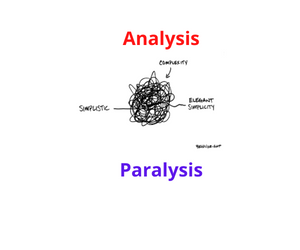This week’s post is inspired by a feedback on last week’s post, as well as some recent conversations with industry contacts.
In response to last week’s post on why good decisions are not made, I was offered some further and very useful theory: in large Banking organisations, there is often a strange culture mix to be found:
A) the Civil service mentality versus B) some entrepreneurial attitude in some ranks. Overall the A’s outnumber the B’s, the 80:20 rule certainly applying.
In any given project or piece of change, as long as you can keep the scope and composition of your stakeholders to have more B’s than A’s, chances are you get on with change. But if scope increases, and the range of stakeholders expands, you are bound to have more A’s than B’s, and momentum gets lost.
I would add to that useful observation that there are other influences at work, both of which are generally not very useful. Firstly consensus. This one of the “C words” that affect the Swiss psyche in particular. We are not very good at competition or communication and spend way too long on consensus. To me the latter is a synonym for compromise and I find myself firmly in the camp of Margaret Thatcher on this. She observed that compromise is when everybody gives up on what they want in favour of something nobody wants. The Iron Lady would not have been at home in Switzerland and would not, I suspect, have got on in Swiss politics. The second curse is that of political correctness. We have to involve everybody, everybody gets consulted. Now getting as complete a picture as possible is a good thing, but that does not mean we have to wait for everybody to agree. I am in favour of “benign dictatorship”; somebody has to say: “I am in charge here, we are going this way” and he has to be prepared to be wrong and possibly shot later. One of my old managers at Goldman Sachs, Neil Moskowitz, once told me: “Make 10 decisions a day. One will be great, eight will be ok, and one will crap. Make another 10 tomorrow.” Have to agree with that and it certainly got Neil somewhere as he ended up as CFO of IB at CS Group.
This willingness to draw the debate to a close and come to a conclusion and move forward is an important trait. Make the decision and move on. Size of organisation seems to play a role here. A good friend of mine from days at Goldman Sachs moved recently from UBS to a smaller buy-side shop in the US, where they have only some 600 people. He waxed lyrical about how in this new environment there was the ability to make a decision and move on. Commenting on his former shop, he observed they are still talking about things that were on the agenda over 18 months ago when he was there. I heard a very similar observation in a recent conversation with a potential new client last week. Similar, smaller organisation and he enthused about how he had been able to make lots of decisions quickly and move on.
Lessons Learned: Size perhaps does matter. Changing large organisations is indeed hard. Leaders need to be empowered and they need to use that power. They will likely loose friends along the way. In the manner of Margaret Thatcher, they need the courage of their convictions and the iron will to set a direction and follow it.
My thanks to Andy Aschwanden for offering the feedback on bureaucrats and entrepreneurs. Andy is a great process guy and very thoughtful Ops professional.
A personal request: Comments and feedback from regular readers are very welcome. Thank you for each and every one of them. If you find this Blog useful, please subscribe. There is an E-Mail tool and an RSS link on the right hand side of the main Blog page. If you like it enough to share, please share this with a friend or two and ask them to subscribe too. If I am wide of the mark and not offering anything of use, please comment or make contact directly via E-Mail
Share on:



